Intercultural Analysis: Individualism, Collectivism & Business Context
VerifiedAdded on 2023/01/19
|8
|2291
|29
Report
AI Summary
This report delves into the concepts of individualism and collectivism within the context of international business, analyzing their impact on workplace dynamics and management strategies. It explores how cultural preferences influence rapport management and examines the cultural differences in impression management and ethical considerations. The report includes a literature review discussing the concepts of individualism and collectivism, their advantages, disadvantages, and their effects on workplace environments. The report highlights how individualism emphasizes individual rights and responsibilities, fostering competition and innovation, while collectivism prioritizes group goals, enhancing cooperation and decision-making. The report also explores the challenges and benefits of both approaches, concluding that the optimal approach depends on specific organizational contexts. The report references key academic literature to support its analysis and findings.
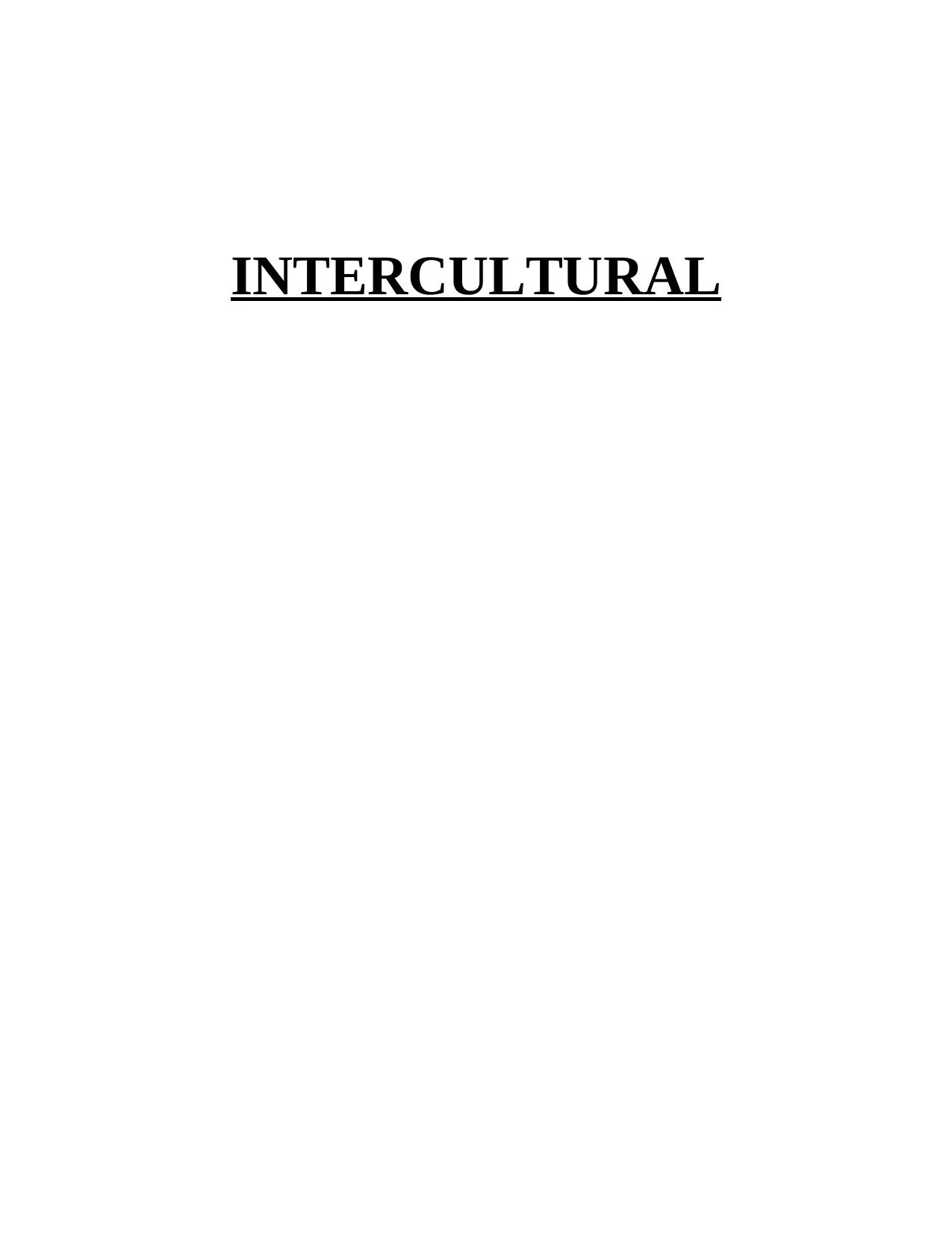
INTERCULTURAL
Paraphrase This Document
Need a fresh take? Get an instant paraphrase of this document with our AI Paraphraser
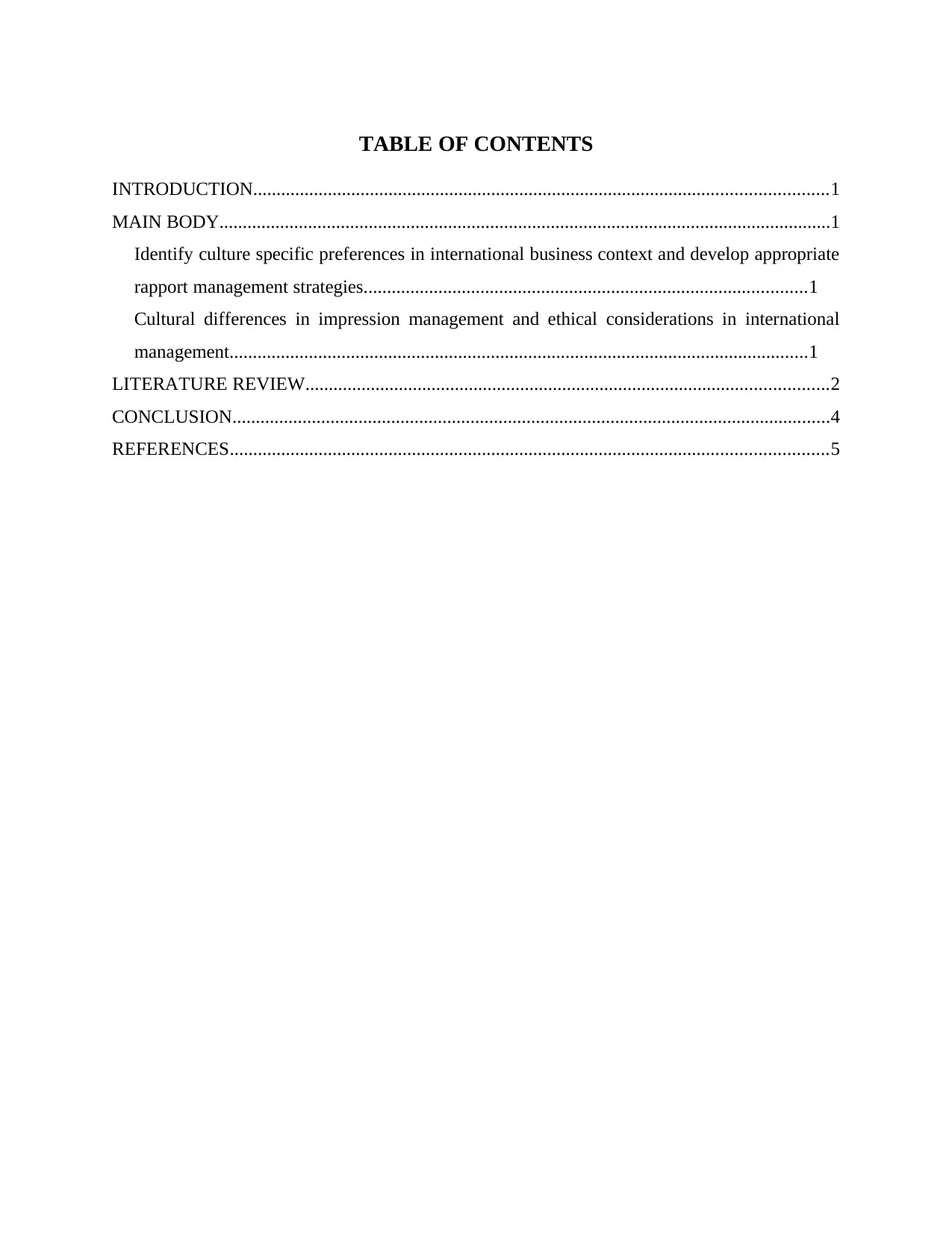
TABLE OF CONTENTS
INTRODUCTION...........................................................................................................................1
MAIN BODY...................................................................................................................................1
Identify culture specific preferences in international business context and develop appropriate
rapport management strategies...............................................................................................1
Cultural differences in impression management and ethical considerations in international
management............................................................................................................................1
LITERATURE REVIEW................................................................................................................2
CONCLUSION................................................................................................................................4
REFERENCES................................................................................................................................5
INTRODUCTION...........................................................................................................................1
MAIN BODY...................................................................................................................................1
Identify culture specific preferences in international business context and develop appropriate
rapport management strategies...............................................................................................1
Cultural differences in impression management and ethical considerations in international
management............................................................................................................................1
LITERATURE REVIEW................................................................................................................2
CONCLUSION................................................................................................................................4
REFERENCES................................................................................................................................5
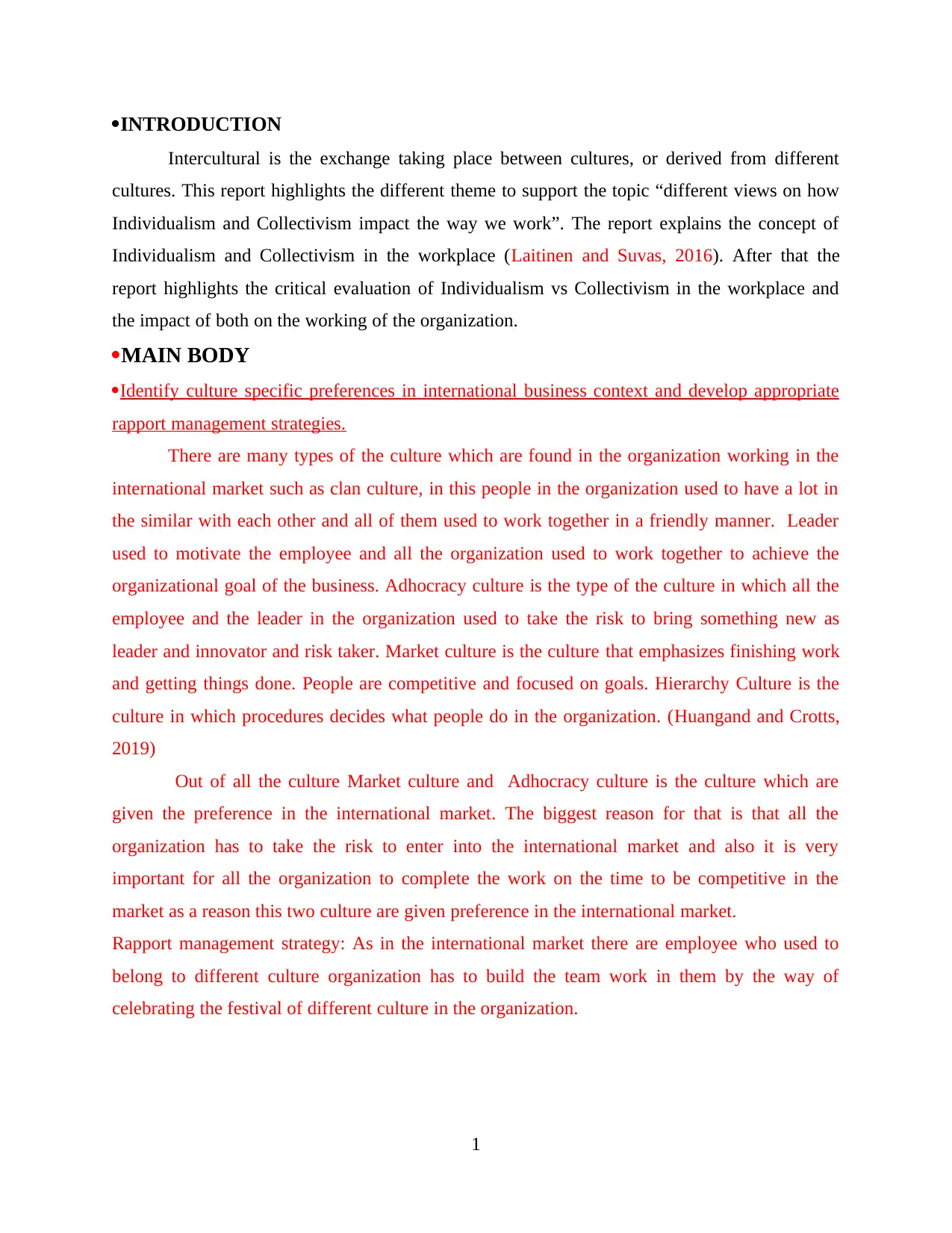
·INTRODUCTION
Intercultural is the exchange taking place between cultures, or derived from different
cultures. This report highlights the different theme to support the topic “different views on how
Individualism and Collectivism impact the way we work”. The report explains the concept of
Individualism and Collectivism in the workplace (Laitinen and Suvas, 2016). After that the
report highlights the critical evaluation of Individualism vs Collectivism in the workplace and
the impact of both on the working of the organization.
·MAIN BODY
·Identify culture specific preferences in international business context and develop appropriate
rapport management strategies.
There are many types of the culture which are found in the organization working in the
international market such as clan culture, in this people in the organization used to have a lot in
the similar with each other and all of them used to work together in a friendly manner. Leader
used to motivate the employee and all the organization used to work together to achieve the
organizational goal of the business. Adhocracy culture is the type of the culture in which all the
employee and the leader in the organization used to take the risk to bring something new as
leader and innovator and risk taker. Market culture is the culture that emphasizes finishing work
and getting things done. People are competitive and focused on goals. Hierarchy Culture is the
culture in which procedures decides what people do in the organization. (Huangand and Crotts,
2019)
Out of all the culture Market culture and Adhocracy culture is the culture which are
given the preference in the international market. The biggest reason for that is that all the
organization has to take the risk to enter into the international market and also it is very
important for all the organization to complete the work on the time to be competitive in the
market as a reason this two culture are given preference in the international market.
Rapport management strategy: As in the international market there are employee who used to
belong to different culture organization has to build the team work in them by the way of
celebrating the festival of different culture in the organization.
1
Intercultural is the exchange taking place between cultures, or derived from different
cultures. This report highlights the different theme to support the topic “different views on how
Individualism and Collectivism impact the way we work”. The report explains the concept of
Individualism and Collectivism in the workplace (Laitinen and Suvas, 2016). After that the
report highlights the critical evaluation of Individualism vs Collectivism in the workplace and
the impact of both on the working of the organization.
·MAIN BODY
·Identify culture specific preferences in international business context and develop appropriate
rapport management strategies.
There are many types of the culture which are found in the organization working in the
international market such as clan culture, in this people in the organization used to have a lot in
the similar with each other and all of them used to work together in a friendly manner. Leader
used to motivate the employee and all the organization used to work together to achieve the
organizational goal of the business. Adhocracy culture is the type of the culture in which all the
employee and the leader in the organization used to take the risk to bring something new as
leader and innovator and risk taker. Market culture is the culture that emphasizes finishing work
and getting things done. People are competitive and focused on goals. Hierarchy Culture is the
culture in which procedures decides what people do in the organization. (Huangand and Crotts,
2019)
Out of all the culture Market culture and Adhocracy culture is the culture which are
given the preference in the international market. The biggest reason for that is that all the
organization has to take the risk to enter into the international market and also it is very
important for all the organization to complete the work on the time to be competitive in the
market as a reason this two culture are given preference in the international market.
Rapport management strategy: As in the international market there are employee who used to
belong to different culture organization has to build the team work in them by the way of
celebrating the festival of different culture in the organization.
1
⊘ This is a preview!⊘
Do you want full access?
Subscribe today to unlock all pages.

Trusted by 1+ million students worldwide
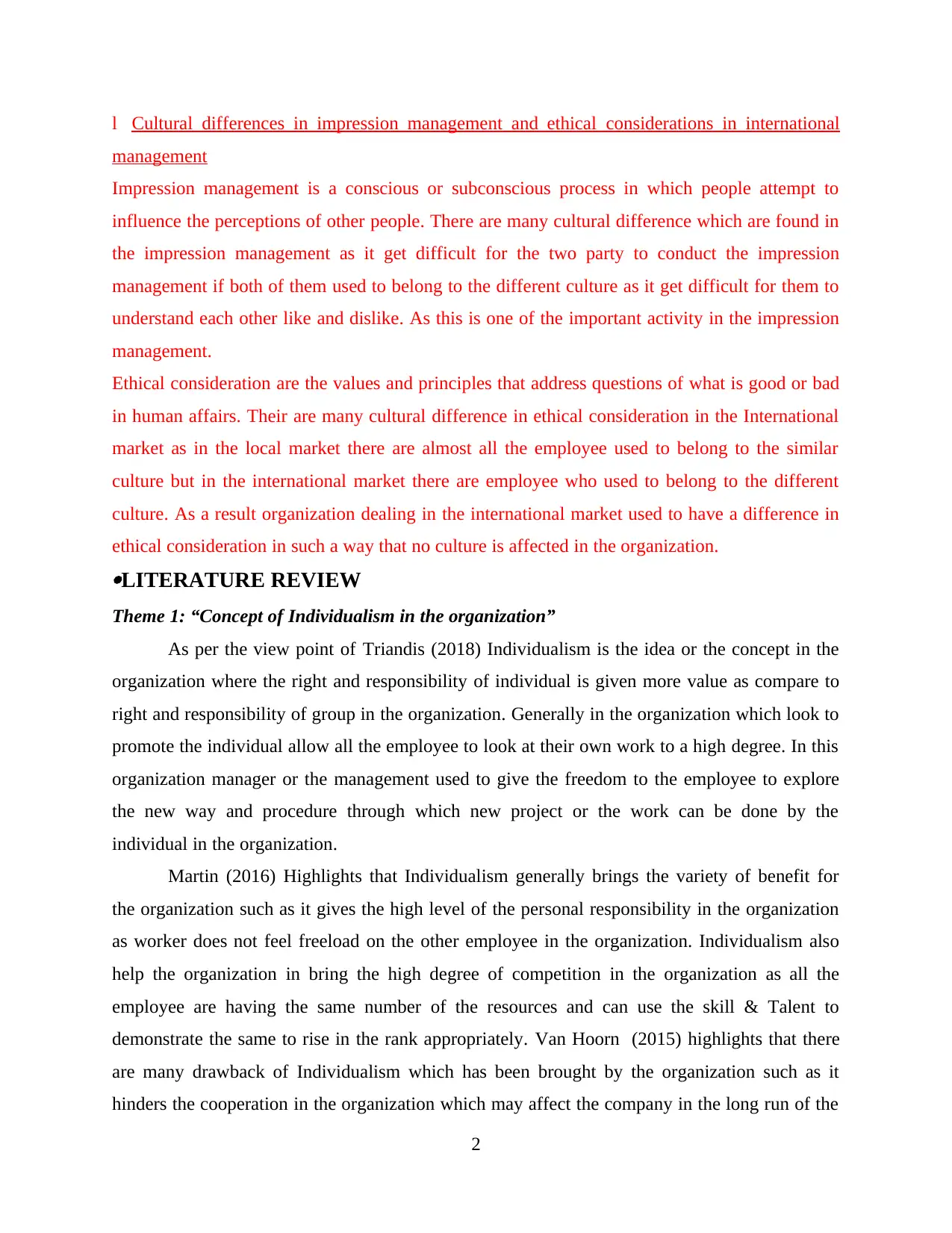
l壱Cultural differences in impression management and ethical considerations in international
management
Impression management is a conscious or subconscious process in which people attempt to
influence the perceptions of other people. There are many cultural difference which are found in
the impression management as it get difficult for the two party to conduct the impression
management if both of them used to belong to the different culture as it get difficult for them to
understand each other like and dislike. As this is one of the important activity in the impression
management.
Ethical consideration are the values and principles that address questions of what is good or bad
in human affairs. Their are many cultural difference in ethical consideration in the International
market as in the local market there are almost all the employee used to belong to the similar
culture but in the international market there are employee who used to belong to the different
culture. As a result organization dealing in the international market used to have a difference in
ethical consideration in such a way that no culture is affected in the organization.·LITERATURE REVIEW
Theme 1: “Concept of Individualism in the organization”
As per the view point of Triandis (2018) Individualism is the idea or the concept in the
organization where the right and responsibility of individual is given more value as compare to
right and responsibility of group in the organization. Generally in the organization which look to
promote the individual allow all the employee to look at their own work to a high degree. In this
organization manager or the management used to give the freedom to the employee to explore
the new way and procedure through which new project or the work can be done by the
individual in the organization.
Martin (2016) Highlights that Individualism generally brings the variety of benefit for
the organization such as it gives the high level of the personal responsibility in the organization
as worker does not feel freeload on the other employee in the organization. Individualism also
help the organization in bring the high degree of competition in the organization as all the
employee are having the same number of the resources and can use the skill & Talent to
demonstrate the same to rise in the rank appropriately. Van Hoorn (2015) highlights that there
are many drawback of Individualism which has been brought by the organization such as it
hinders the cooperation in the organization which may affect the company in the long run of the
2
management
Impression management is a conscious or subconscious process in which people attempt to
influence the perceptions of other people. There are many cultural difference which are found in
the impression management as it get difficult for the two party to conduct the impression
management if both of them used to belong to the different culture as it get difficult for them to
understand each other like and dislike. As this is one of the important activity in the impression
management.
Ethical consideration are the values and principles that address questions of what is good or bad
in human affairs. Their are many cultural difference in ethical consideration in the International
market as in the local market there are almost all the employee used to belong to the similar
culture but in the international market there are employee who used to belong to the different
culture. As a result organization dealing in the international market used to have a difference in
ethical consideration in such a way that no culture is affected in the organization.·LITERATURE REVIEW
Theme 1: “Concept of Individualism in the organization”
As per the view point of Triandis (2018) Individualism is the idea or the concept in the
organization where the right and responsibility of individual is given more value as compare to
right and responsibility of group in the organization. Generally in the organization which look to
promote the individual allow all the employee to look at their own work to a high degree. In this
organization manager or the management used to give the freedom to the employee to explore
the new way and procedure through which new project or the work can be done by the
individual in the organization.
Martin (2016) Highlights that Individualism generally brings the variety of benefit for
the organization such as it gives the high level of the personal responsibility in the organization
as worker does not feel freeload on the other employee in the organization. Individualism also
help the organization in bring the high degree of competition in the organization as all the
employee are having the same number of the resources and can use the skill & Talent to
demonstrate the same to rise in the rank appropriately. Van Hoorn (2015) highlights that there
are many drawback of Individualism which has been brought by the organization such as it
hinders the cooperation in the organization which may affect the company in the long run of the
2
Paraphrase This Document
Need a fresh take? Get an instant paraphrase of this document with our AI Paraphraser
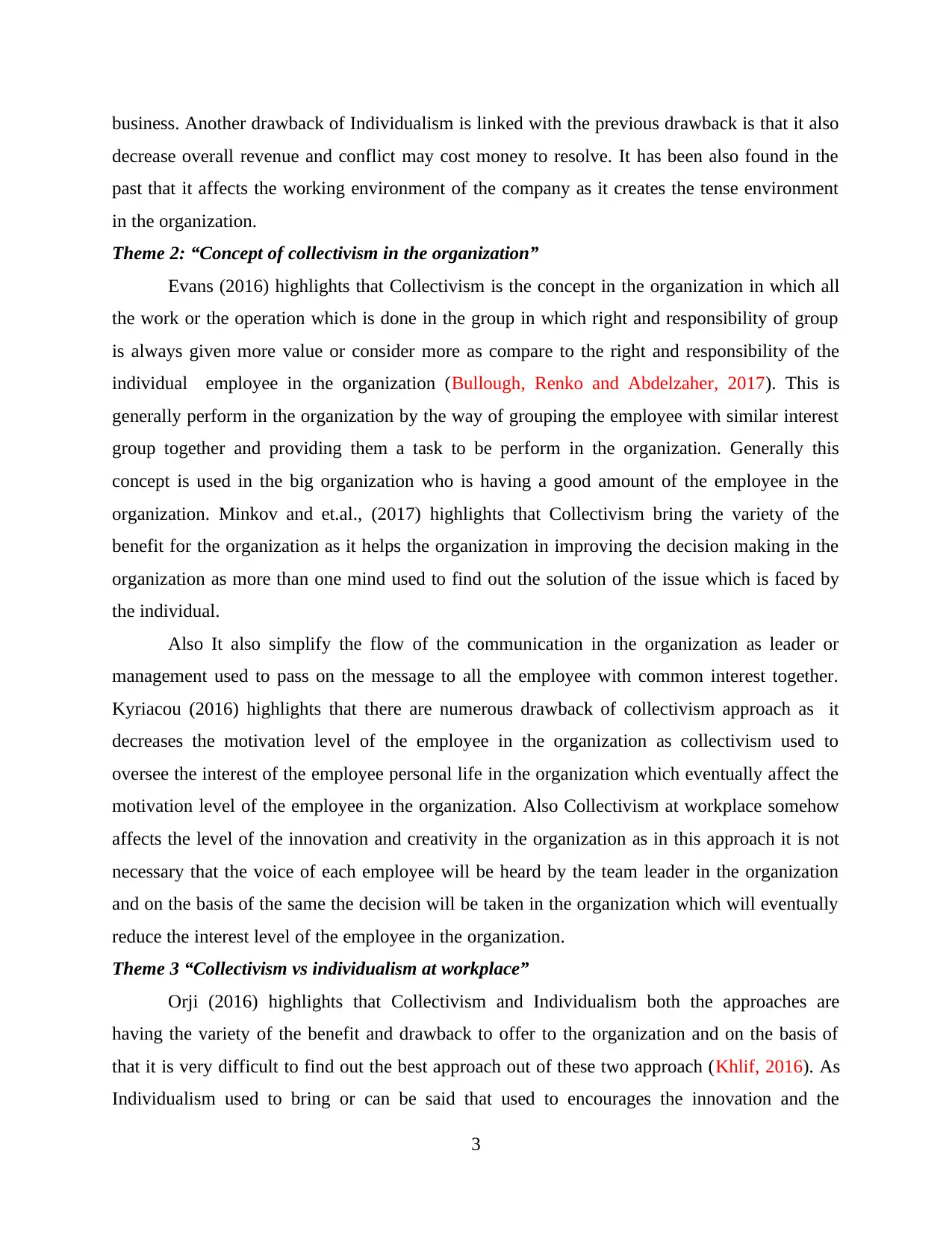
business. Another drawback of Individualism is linked with the previous drawback is that it also
decrease overall revenue and conflict may cost money to resolve. It has been also found in the
past that it affects the working environment of the company as it creates the tense environment
in the organization.
Theme 2: “Concept of collectivism in the organization”
Evans (2016) highlights that Collectivism is the concept in the organization in which all
the work or the operation which is done in the group in which right and responsibility of group
is always given more value or consider more as compare to the right and responsibility of the
individual employee in the organization (Bullough, Renko and Abdelzaher, 2017). This is
generally perform in the organization by the way of grouping the employee with similar interest
group together and providing them a task to be perform in the organization. Generally this
concept is used in the big organization who is having a good amount of the employee in the
organization. Minkov and et.al., (2017) highlights that Collectivism bring the variety of the
benefit for the organization as it helps the organization in improving the decision making in the
organization as more than one mind used to find out the solution of the issue which is faced by
the individual.
Also It also simplify the flow of the communication in the organization as leader or
management used to pass on the message to all the employee with common interest together.
Kyriacou (2016) highlights that there are numerous drawback of collectivism approach as it
decreases the motivation level of the employee in the organization as collectivism used to
oversee the interest of the employee personal life in the organization which eventually affect the
motivation level of the employee in the organization. Also Collectivism at workplace somehow
affects the level of the innovation and creativity in the organization as in this approach it is not
necessary that the voice of each employee will be heard by the team leader in the organization
and on the basis of the same the decision will be taken in the organization which will eventually
reduce the interest level of the employee in the organization.
Theme 3 “Collectivism vs individualism at workplace”
Orji (2016) highlights that Collectivism and Individualism both the approaches are
having the variety of the benefit and drawback to offer to the organization and on the basis of
that it is very difficult to find out the best approach out of these two approach (Khlif, 2016). As
Individualism used to bring or can be said that used to encourages the innovation and the
3
decrease overall revenue and conflict may cost money to resolve. It has been also found in the
past that it affects the working environment of the company as it creates the tense environment
in the organization.
Theme 2: “Concept of collectivism in the organization”
Evans (2016) highlights that Collectivism is the concept in the organization in which all
the work or the operation which is done in the group in which right and responsibility of group
is always given more value or consider more as compare to the right and responsibility of the
individual employee in the organization (Bullough, Renko and Abdelzaher, 2017). This is
generally perform in the organization by the way of grouping the employee with similar interest
group together and providing them a task to be perform in the organization. Generally this
concept is used in the big organization who is having a good amount of the employee in the
organization. Minkov and et.al., (2017) highlights that Collectivism bring the variety of the
benefit for the organization as it helps the organization in improving the decision making in the
organization as more than one mind used to find out the solution of the issue which is faced by
the individual.
Also It also simplify the flow of the communication in the organization as leader or
management used to pass on the message to all the employee with common interest together.
Kyriacou (2016) highlights that there are numerous drawback of collectivism approach as it
decreases the motivation level of the employee in the organization as collectivism used to
oversee the interest of the employee personal life in the organization which eventually affect the
motivation level of the employee in the organization. Also Collectivism at workplace somehow
affects the level of the innovation and creativity in the organization as in this approach it is not
necessary that the voice of each employee will be heard by the team leader in the organization
and on the basis of the same the decision will be taken in the organization which will eventually
reduce the interest level of the employee in the organization.
Theme 3 “Collectivism vs individualism at workplace”
Orji (2016) highlights that Collectivism and Individualism both the approaches are
having the variety of the benefit and drawback to offer to the organization and on the basis of
that it is very difficult to find out the best approach out of these two approach (Khlif, 2016). As
Individualism used to bring or can be said that used to encourages the innovation and the
3
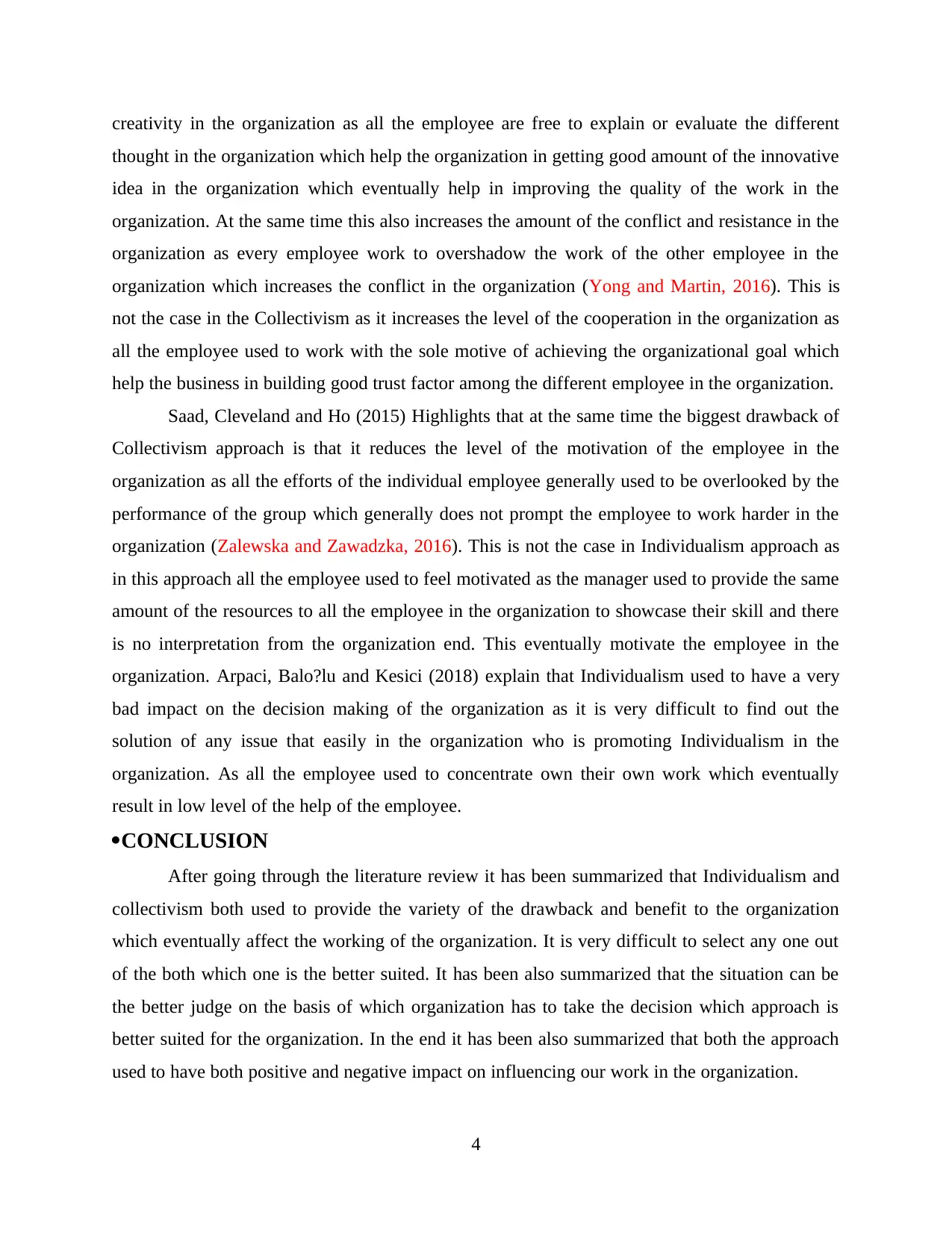
creativity in the organization as all the employee are free to explain or evaluate the different
thought in the organization which help the organization in getting good amount of the innovative
idea in the organization which eventually help in improving the quality of the work in the
organization. At the same time this also increases the amount of the conflict and resistance in the
organization as every employee work to overshadow the work of the other employee in the
organization which increases the conflict in the organization (Yong and Martin, 2016). This is
not the case in the Collectivism as it increases the level of the cooperation in the organization as
all the employee used to work with the sole motive of achieving the organizational goal which
help the business in building good trust factor among the different employee in the organization.
Saad, Cleveland and Ho (2015) Highlights that at the same time the biggest drawback of
Collectivism approach is that it reduces the level of the motivation of the employee in the
organization as all the efforts of the individual employee generally used to be overlooked by the
performance of the group which generally does not prompt the employee to work harder in the
organization (Zalewska and Zawadzka, 2016). This is not the case in Individualism approach as
in this approach all the employee used to feel motivated as the manager used to provide the same
amount of the resources to all the employee in the organization to showcase their skill and there
is no interpretation from the organization end. This eventually motivate the employee in the
organization. Arpaci, Balo?lu and Kesici (2018) explain that Individualism used to have a very
bad impact on the decision making of the organization as it is very difficult to find out the
solution of any issue that easily in the organization who is promoting Individualism in the
organization. As all the employee used to concentrate own their own work which eventually
result in low level of the help of the employee.
·CONCLUSION
After going through the literature review it has been summarized that Individualism and
collectivism both used to provide the variety of the drawback and benefit to the organization
which eventually affect the working of the organization. It is very difficult to select any one out
of the both which one is the better suited. It has been also summarized that the situation can be
the better judge on the basis of which organization has to take the decision which approach is
better suited for the organization. In the end it has been also summarized that both the approach
used to have both positive and negative impact on influencing our work in the organization.
4
thought in the organization which help the organization in getting good amount of the innovative
idea in the organization which eventually help in improving the quality of the work in the
organization. At the same time this also increases the amount of the conflict and resistance in the
organization as every employee work to overshadow the work of the other employee in the
organization which increases the conflict in the organization (Yong and Martin, 2016). This is
not the case in the Collectivism as it increases the level of the cooperation in the organization as
all the employee used to work with the sole motive of achieving the organizational goal which
help the business in building good trust factor among the different employee in the organization.
Saad, Cleveland and Ho (2015) Highlights that at the same time the biggest drawback of
Collectivism approach is that it reduces the level of the motivation of the employee in the
organization as all the efforts of the individual employee generally used to be overlooked by the
performance of the group which generally does not prompt the employee to work harder in the
organization (Zalewska and Zawadzka, 2016). This is not the case in Individualism approach as
in this approach all the employee used to feel motivated as the manager used to provide the same
amount of the resources to all the employee in the organization to showcase their skill and there
is no interpretation from the organization end. This eventually motivate the employee in the
organization. Arpaci, Balo?lu and Kesici (2018) explain that Individualism used to have a very
bad impact on the decision making of the organization as it is very difficult to find out the
solution of any issue that easily in the organization who is promoting Individualism in the
organization. As all the employee used to concentrate own their own work which eventually
result in low level of the help of the employee.
·CONCLUSION
After going through the literature review it has been summarized that Individualism and
collectivism both used to provide the variety of the drawback and benefit to the organization
which eventually affect the working of the organization. It is very difficult to select any one out
of the both which one is the better suited. It has been also summarized that the situation can be
the better judge on the basis of which organization has to take the decision which approach is
better suited for the organization. In the end it has been also summarized that both the approach
used to have both positive and negative impact on influencing our work in the organization.
4
⊘ This is a preview!⊘
Do you want full access?
Subscribe today to unlock all pages.

Trusted by 1+ million students worldwide
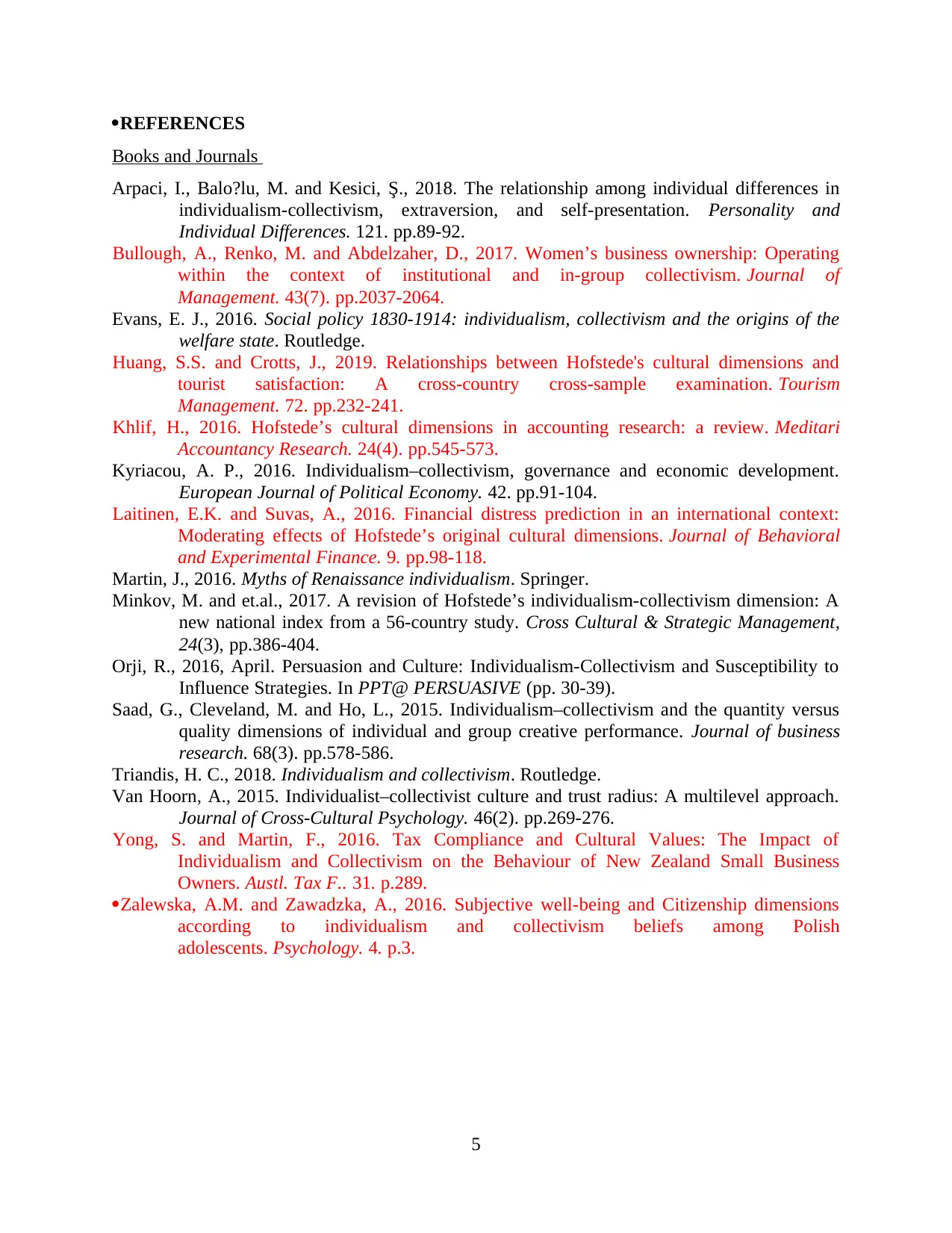
·REFERENCES
Books and Journals
Arpaci, I., Balo?lu, M. and Kesici, Ş., 2018. The relationship among individual differences in
individualism-collectivism, extraversion, and self-presentation. Personality and
Individual Differences. 121. pp.89-92.
Bullough, A., Renko, M. and Abdelzaher, D., 2017. Women’s business ownership: Operating
within the context of institutional and in-group collectivism. Journal of
Management. 43(7). pp.2037-2064.
Evans, E. J., 2016. Social policy 1830-1914: individualism, collectivism and the origins of the
welfare state. Routledge.
Huang, S.S. and Crotts, J., 2019. Relationships between Hofstede's cultural dimensions and
tourist satisfaction: A cross-country cross-sample examination. Tourism
Management. 72. pp.232-241.
Khlif, H., 2016. Hofstede’s cultural dimensions in accounting research: a review. Meditari
Accountancy Research. 24(4). pp.545-573.
Kyriacou, A. P., 2016. Individualism–collectivism, governance and economic development.
European Journal of Political Economy. 42. pp.91-104.
Laitinen, E.K. and Suvas, A., 2016. Financial distress prediction in an international context:
Moderating effects of Hofstede’s original cultural dimensions. Journal of Behavioral
and Experimental Finance. 9. pp.98-118.
Martin, J., 2016. Myths of Renaissance individualism. Springer.
Minkov, M. and et.al., 2017. A revision of Hofstede’s individualism-collectivism dimension: A
new national index from a 56-country study. Cross Cultural & Strategic Management,
24(3), pp.386-404.
Orji, R., 2016, April. Persuasion and Culture: Individualism-Collectivism and Susceptibility to
Influence Strategies. In PPT@ PERSUASIVE (pp. 30-39).
Saad, G., Cleveland, M. and Ho, L., 2015. Individualism–collectivism and the quantity versus
quality dimensions of individual and group creative performance. Journal of business
research. 68(3). pp.578-586.
Triandis, H. C., 2018. Individualism and collectivism. Routledge.
Van Hoorn, A., 2015. Individualist–collectivist culture and trust radius: A multilevel approach.
Journal of Cross-Cultural Psychology. 46(2). pp.269-276.
Yong, S. and Martin, F., 2016. Tax Compliance and Cultural Values: The Impact of
Individualism and Collectivism on the Behaviour of New Zealand Small Business
Owners. Austl. Tax F.. 31. p.289.
·Zalewska, A.M. and Zawadzka, A., 2016. Subjective well-being and Citizenship dimensions
according to individualism and collectivism beliefs among Polish
adolescents. Psychology. 4. p.3.
5
Books and Journals
Arpaci, I., Balo?lu, M. and Kesici, Ş., 2018. The relationship among individual differences in
individualism-collectivism, extraversion, and self-presentation. Personality and
Individual Differences. 121. pp.89-92.
Bullough, A., Renko, M. and Abdelzaher, D., 2017. Women’s business ownership: Operating
within the context of institutional and in-group collectivism. Journal of
Management. 43(7). pp.2037-2064.
Evans, E. J., 2016. Social policy 1830-1914: individualism, collectivism and the origins of the
welfare state. Routledge.
Huang, S.S. and Crotts, J., 2019. Relationships between Hofstede's cultural dimensions and
tourist satisfaction: A cross-country cross-sample examination. Tourism
Management. 72. pp.232-241.
Khlif, H., 2016. Hofstede’s cultural dimensions in accounting research: a review. Meditari
Accountancy Research. 24(4). pp.545-573.
Kyriacou, A. P., 2016. Individualism–collectivism, governance and economic development.
European Journal of Political Economy. 42. pp.91-104.
Laitinen, E.K. and Suvas, A., 2016. Financial distress prediction in an international context:
Moderating effects of Hofstede’s original cultural dimensions. Journal of Behavioral
and Experimental Finance. 9. pp.98-118.
Martin, J., 2016. Myths of Renaissance individualism. Springer.
Minkov, M. and et.al., 2017. A revision of Hofstede’s individualism-collectivism dimension: A
new national index from a 56-country study. Cross Cultural & Strategic Management,
24(3), pp.386-404.
Orji, R., 2016, April. Persuasion and Culture: Individualism-Collectivism and Susceptibility to
Influence Strategies. In PPT@ PERSUASIVE (pp. 30-39).
Saad, G., Cleveland, M. and Ho, L., 2015. Individualism–collectivism and the quantity versus
quality dimensions of individual and group creative performance. Journal of business
research. 68(3). pp.578-586.
Triandis, H. C., 2018. Individualism and collectivism. Routledge.
Van Hoorn, A., 2015. Individualist–collectivist culture and trust radius: A multilevel approach.
Journal of Cross-Cultural Psychology. 46(2). pp.269-276.
Yong, S. and Martin, F., 2016. Tax Compliance and Cultural Values: The Impact of
Individualism and Collectivism on the Behaviour of New Zealand Small Business
Owners. Austl. Tax F.. 31. p.289.
·Zalewska, A.M. and Zawadzka, A., 2016. Subjective well-being and Citizenship dimensions
according to individualism and collectivism beliefs among Polish
adolescents. Psychology. 4. p.3.
5
Paraphrase This Document
Need a fresh take? Get an instant paraphrase of this document with our AI Paraphraser

·
6
6
1 out of 8
Related Documents
Your All-in-One AI-Powered Toolkit for Academic Success.
+13062052269
info@desklib.com
Available 24*7 on WhatsApp / Email
![[object Object]](/_next/static/media/star-bottom.7253800d.svg)
Unlock your academic potential
Copyright © 2020–2026 A2Z Services. All Rights Reserved. Developed and managed by ZUCOL.





